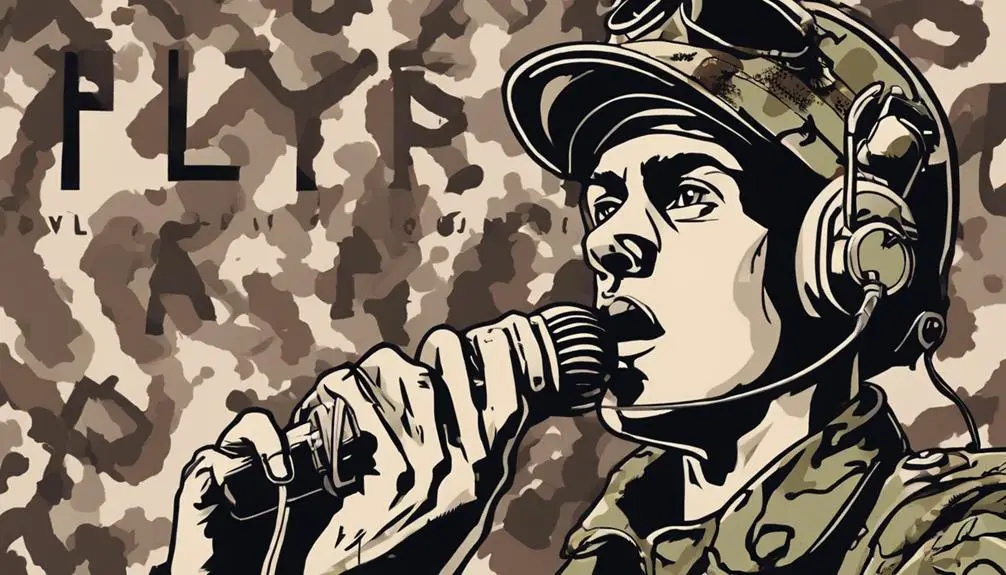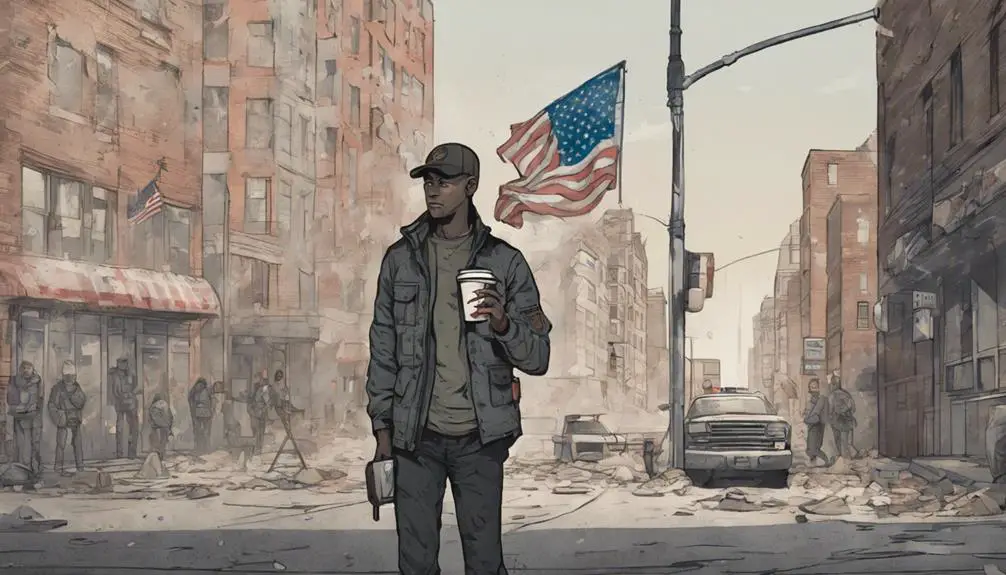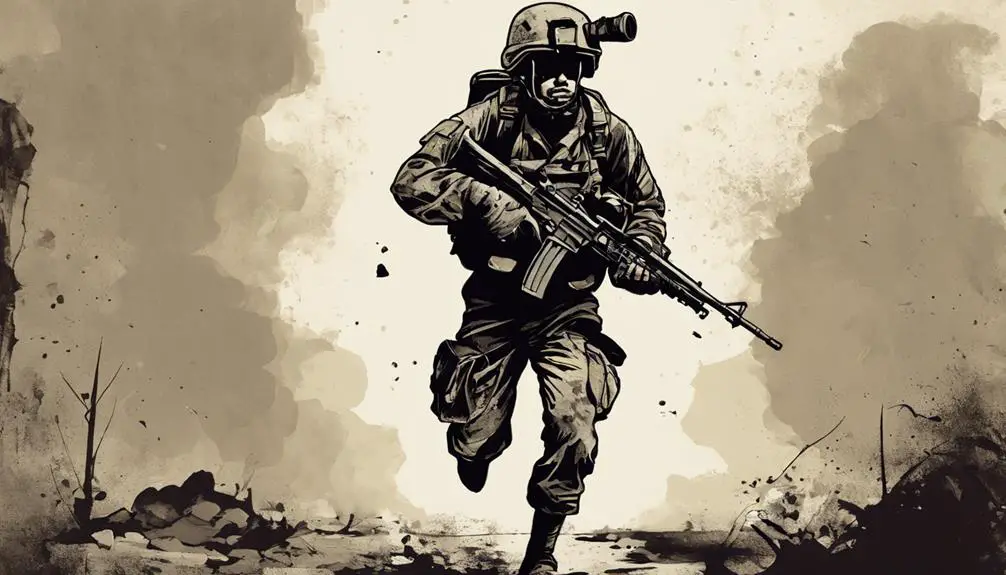You've likely stumbled upon "Charlie Mike" in military circles, but do you know what it really means? This phrase is more than just a casual expression – it's a powerful symbol of perseverance and determination. Originating in the Vietnam War era, "Charlie Mike" means "Continue Mission" or "Confirm," and its cultural significance has transcended its military roots to inspire people from all walks of life. From its phonetic alphabet roots to its everyday use, understanding "Charlie Mike" requires unpacking its rich history and cultural context. As you explore further, you'll uncover the fascinating story behind this iconic military slang.
Decoding the Phonetic Alphabet

How do you decipher the seemingly cryptic messages exchanged by military personnel, where 'Bravo' means 'B' and 'Mike' means 'M'? The answer lies in the phonetic alphabet, a standardized system used to clearly communicate letters and numbers over radio and phone communications. This system is essential in high-stress environments where clarity is important.
Phonetic limitations can lead to miscommunication, and that's where the phonetic alphabet comes in. The alphabet has undergone evolution over the years to minimize confusion between similar-sounding letters. For instance, the original 'Able Baker' phonetic alphabet used during World War II was replaced by the 'Alpha Bravo' system in the 1950s. This change helped reduce errors caused by acoustic similarities between words.
Understanding the phonetic alphabet is crucial for effective communication in military operations. By replacing each letter with a code word, personnel can guarantee accurate transmission of critical information.
As you learn to decode these messages, you'll gain insight into the precise language used by military personnel to convey important information.
Essential Charlie Mike Phrases
You'll often hear military personnel using specific phrases to convey important information quickly and efficiently, and understanding these Charlie Mike phrases is vital for effective communication in high-pressure situations.
As you learn military lingo, it's essential to familiarize yourself with essential phrases that facilitate tactical communication.
In the heat of the moment, every second counts, and using the right phrases can mean the difference between success and failure. For instance, 'Roger that' confirms receipt of an order, while 'Say again' requests clarification.
'Over' signals the end of a transmission, and 'Out' indicates the end of a conversation. 'Wilco' (will comply) acknowledges an order, and 'Wait one' requests a brief pause.
'Hooah' expresses excitement or motivation, while 'Hold what you've got' instructs troops to maintain their current position.
Mastering these essential Charlie Mike phrases enables seamless communication, ensuring that critical information is conveyed swiftly and accurately.
Military Slang in Everyday Use

Military slang has permeated everyday language, with phrases like 'Hooah' and 'Roger that' becoming ubiquitous in civilian conversation, reflecting the cultural significance of military terminology beyond the battlefield.
You've likely used these phrases in casual conversation, unaware of their military origins. This phenomenon highlights the cultural impact of military slang on civilian adoption. The incorporation of military terminology into everyday language speaks to the profound influence the military has on popular culture.
You might be surprised to know that phrases like 'Semper Fi' and 'Sitrep' have become an integral part of your conversational repertoire. The widespread adoption of military slang is a confirmation to the cultural significance of military terminology in modern society.
As you use these phrases, you're participating in a cultural exchange that transcends the military-civilian divide. By embracing military slang, you're acknowledging the cultural impact of the military on everyday life.
Origins of Charlie Mike Slang
As you investigate the world of military slang, you'll find that phrases like Charlie Mike have origins dating back to the Vietnam War era. During this time, the US military adopted a phonetic alphabet to clearly communicate letters and words over radio transmissions. This alphabet, also known as the NATO phonetic alphabet, replaced letters with code words to avoid confusion. 'Charlie' represented the letter 'C' and 'Mike' represented the letter 'M'.
Over time, the phrase 'Charlie Mike' became synonymous with 'Continue Mission' or 'Confirm', symbolizing perseverance and determination.
The historical evolution of military slang like Charlie Mike reflects the cultural significance of the military's influence on language. As military personnel returned to civilian life, they brought these phrases with them, integrating them into everyday conversation. Charlie Mike, in particular, has become a rallying cry for those who embody its spirit of resilience.
As you explore further into the world of military slang, you'll discover how phrases like Charlie Mike have become an integral part of our cultural heritage, transcending their military roots to inspire and motivate people from all walks of life.
Unraveling Military Jargon

Deciphering military jargon, like Charlie Mike, requires understanding the context and nuances that give these phrases their unique flavor and emotional resonance.
You might be familiar with the term 'Charlie Mike,' but have you ever stopped to think about where it comes from? Military jargon is more than just a collection of words; it's a reflection of the culture, history, and values of the military community.
Here are three key takeaways to help you unravel military jargon:
- Military Etymology: Many military phrases have roots in ancient languages, such as Latin and Greek. Understanding the etymology of these words can provide valuable insight into their original meaning and context.
- Jargon Evolution: Military jargon isn't static; it evolves over time, reflecting changes in technology, tactics, and cultural norms. Recognizing this evolution can help you better understand the nuances of military communication.
- Context is Key: Military jargon often relies on shared experiences, inside jokes, and cultural references that are unique to the military community. To truly grasp military jargon, you need to take into account the context in which it's used.
Frequently Asked Questions
Is Charlie Mike Slang Exclusive to the US Military?
You're wondering if a certain phrase is exclusive to the US military. Let's explore further.
While 'Charlie Mike' originated in the US military, it's not exclusive to it. The phrase, meaning 'continue mission,' has cultural significance beyond military origins.
It's been adopted by civilians, symbolizing perseverance and resilience. You'll find it in popular culture, from music to motivational speeches.
Can Civilians Use Charlie Mike Slang in Everyday Conversations?
Can you truly own a phrase just because you learned it from a specific group?
When it comes to using military slang like 'Charlie Mike' in everyday conversations, you might wonder if it's acceptable.
The answer lies in cultural appropriation and language evolution. While it's not exclusive to the military, using it without understanding its origins might be seen as appropriation.
However, language is meant to evolve, and if you use it respectfully, it can become a natural part of your vocabulary.
Is Charlie Mike Slang Used in All Branches of the Military?
You might wonder if military jargon is universal across all branches. The answer is no. While some terms are shared, each branch has its unique lingo, reflecting their distinct cultures and histories.
Branch differences are evident in their slang, with the Army, Navy, Air Force, Marines, and Coast Guard each having their own flavor. This means that military jargon, although similar, isn't identical across all branches.
Are There Regional Variations of Charlie Mike Slang?
As you explore the world of military dialects, you'll discover that regional variations are as inevitable as the tides. Like the ancient Greek myth of Proteus, languages evolve, adapting to their environments.
Military slang is no exception. You'll find that different regions, with their unique cultural influences, shape the slang used by soldiers. While some terms may be universally understood, others are specific to particular regions or branches, reflecting the dynamic nature of slang evolution.
Can Charlie Mike Slang Be Used in Formal Military Communications?
When communicating in formal military settings, you should avoid using colloquial expressions, including Charlie Mike slang.
While it's understandable to simplify complex ideas, clarity is key in critical situations.
In formal military communications, sticking to standardized protocol guarantees messages are conveyed accurately and efficiently.
Making exceptions to protocol can compromise communication clarity, which is unacceptable in high-stakes situations.
Conclusion
As you explore the world of military slang, the phrase 'Charlie Mike' becomes a familiar refrain, echoing like a drumbeat in the background of military communications. Like a cryptic code, it holds secrets and stories, waiting to be deciphered.
Now, equipped with the knowledge of this phonetic alphabet, you're ready to decipher the code and uncover the doors to a world of military jargon, where 'Charlie Mike' is more than just a phrase – it's a battle cry.







